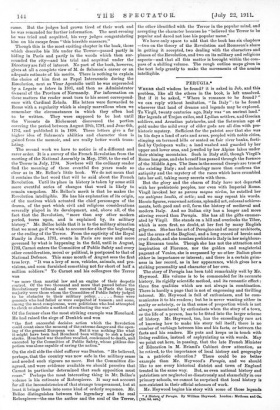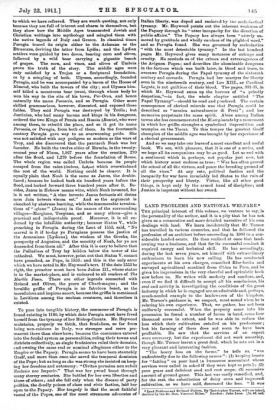PERUGIA.*
WHERE shall wisdom be found? it is asked in Job, and this problem, like all the others in the book, is left unsolved. But if it be asked, "Where is romance to be found ? " we can reply without hesitation, "In Italy " : to be found wherever that land of dreams and legends may be explored. To Virgil, twenty centuries ago, Italy was "an ancient land." Her legends of Trojan exiles, and Lydian settlers, and Grecian soldiers, and Arcadian patriarchs, and the Saturnian age of gold under the mild sway of elder gods are all dim with pre- historic mystery. Sufficient for the patriot seer that she was in his days a land of arts and arms, peopled with noble cities, clinging on terraced hills or seated on fair river banks, forti- fied by Cyclopean walls ; a land washed and guarded by her upper and lower seas, and jewelled by her Alpine lakes under their shining mountains. Such is Italy still, though Virgil's Rome has gone, and she herself has passed through the furnace of the Middle Ages. The lines in the second Georgic are true of the existing Italy ; and archteology more than confirms the antiquity and the mystery of the races which have crumbled into her soil, taking many secrets with them.
But the glory and the charm of Italy have not departed with her prehistoric peoples, nor even with Imperial Rome. Virgil invoked her as parens magna virtim, he extolled her res antiques laudis, et artis; and we may repeat his words. Heroic figures, renowned actions, splendid art, colossal achieve- ments, both good and evil, form the history of mediEeval and modern Italy. And no Italian city has a longer and more stirring record than Perugia. She has all the gifts enumer- ated by Virgil. She stands on a hill and overlooks the Tiber, which is seen first, no doubt, at her feet by many English pilgrims. She has the art of Perugino and of many architects, and the arms of the Baglioni, and a long record of heroic and cruel deeds, and she touches prehistoric Italy in her neighbour- ing Etruscan tombs. Though she has not the attraction and inspiration of Florence, nor the golden and magisterial pageant of Venice, she is surpassed by no other Italian place either in importance or interest ; and there is a certain grim- ness in her record, as in her appearance, which gives her a striking personality and character of her own.
The story of Perugia has been told remarkably well by Mr. Heywood. His volume is to be commended for its accurate history, its rigidly scientific method, and its romantic effect : three fine qualities which are not always in combination. There is hardly .a page that is not of engrossing and thrilling interest. Mr. Heywood is full of enthusiasm, and he com- municates it to his readers ; but he is never wanting either in sanity or sobriety, or in that sense of proportion which is not always remembered by enthusiasts when the story of a town, or the life of a person, has to be fitted into the larger scheme of history. Mr. Heywood, too, has the exceedingly rare art of knowing how to make his story tell itself; there is no cumber of verbiage between him and his facts, or between the facts and his readers. He puts and keeps us in touch with living realities, instead of asphyxiating us with words. May we point out here, in passing, that the late French Minister of Education in M. Briand's Cabinet drew attention, as he retired, to the importance of local history and geography in a patriotic education ? There could be no better example than Mr. Heywood's Perugia, and we should like to see every historical district and town of England treated in the same way. But, as even national history and patriotism are neglected so disastrously and shamefully in our primary schools, we cannot be surprised that local history is non-existent in their official schemes of work.
Mr. Heywood begins his story with some of those legends
• A History of Perugia. By William Heywood. London : Methuen and Co. E12e. 6c1. net.] to which we have referred. They are worth quoting, not only because they are full of interest and charm in themselves, but they show how the Middle Ages transmuted Jewish and Christian writings into mythology and mingled them with the native legends of Italy and Greece. In classical times Perugia traced its origin either to the Achmans or the Etruscans, deriving the latter from Lydia ; and the Lydian settlers were guided by two doves, bearing corn and olives, followed by a wild boar carrying a gigantic bunch of grapes. The corn, and vines, and olives of Umbria prove the truth of the story. The middle ages were only satisfied by a Trojan or a Scriptural foundation, or by a mingling of both. Ulysses, accordingly, founded Perugia, and he was accompanied by a baron of the House of Nimrod, who built the towers of the city ; and Ulysses him- self killed a monstrous bear (orsa), through whose body he won hia way to the site of his town, Per-Ursa, and hence naturally the name Pezoscia, and so Perugia, Other more skilled grammarians, however, dissented, and exposed these fables. They said Perugia was destroyed by Totila ; but Justinian, who had many barons and kings in his dungeons, ordered the two Kings of Persia and Russia (Roseia), who were among them, to rebuild the place, and so it got its name Peraseia., or Perugia, from both of them. In the fourteenth century Perugia gave way to an overweening pride. She was not satisfied with any pedigree so modern as the wars of Troy, and she discovered that the patriarch Noah was her founder. He built the twelve eitiea of Etruria, lathe twenty- second year of Ninus, 1,927 years after the creation, 270 after the flood, and 1,278 before the foundation of Rome. The whole region was called Umbria because ite people escaped from the rains (imbres, gnEpot) which overwhelmed the rest of the world. Nothing could be clearer. It is equally plain that Noah is the same as Janus, the double- faced ; because he looked hack six hundred years before the flood, and looked forward three hundred years after it. Be- sides, Janus in Hebrew means wine, which Noah invented, for is it not written, "A vino invent,- Janus fortassia sit dietns ream Jain hebreis vinum est." And so the argument is clenched by abstruse learning, while the innumerable termina- tions of " -giano " (Janus) in the names of the surrounding villages—Margiano, Torgiane, and so many others—give a practical and indisputable proof. Moreover, it is all en- dorsed by the infallible authority ; because Sixtus V., while preaching in Perugia during the Lent. of 1553, said, "No marvel is it if to-&y ye Perugians possess the justice of the Armenians [Lydiansl, the wisdom of the Greeks, the prosperity of Augustus, and the sanctity of Noah, for ye are descended from them all." After this it is easy to believe that the Palladium of Tray lay hidden below the tower of the cathedral. We must however, point out that Sixtus V. cannot have preached, as Pope, in 1553: and this is the only error which we have noted in Mr. Heyvgood's text. If the date 1553 be right, the preacher must have been Julius III., whose statue is in the market-place, and is endeared to all readers of The Marble Faun- There are other legends connected with Roland and Oliver, the peers of Charlemagne ; and the heraldic griffin of Perugia is no fabulous beast, as the incredulous and impious assert, because the griffin is mentioned in Leviticus among the unclean creatures, and, therefore it existed.
To pass into tangible history, the commune of Perugia is found existing in 1180, by which date Perugia must have freed herself from the tyranny of her Bishop-Counts. Mn Heywood maintains, properly we think, that feudalism, so far from being non-existent in Italy, was stronger and more per- manent there than elsewhere ; because the communes entered into the feudal system as personalities, ruling their towns and districts collectively, as single feudatories ruled their domains, and owning the same real or nominal allegiance either to the Empire or the Papacy. Perugia seems to have been staunchly Guelf, and more than once she saved the temporal dominion of the Pope; but as long as she was strong she insisted on keep- ing her freedom and autonomy : "Civitas perusina non subsit Ecclesie nee Imperio." That was her proud boast through many stormy centuries She battled for her own liberties and those of others ; and she fell only when the disease of party polities, the deadly poison of class and civic faction, laid her open to the Papacy. Her tragedy is that the most faithful vassal of the Popes, one of the most strenuous advocates of
Italian liberty, was duped and enslaved by the eerle4astical tyranny. Mr. Heywood points out the inherent weakness of the Papacy through its " utter incapacity for the direction of public affairs." The Papacy has always been "utterly un- moved by gratitude and wholly careless of its plighted word," and so Perngia found. She was governed by ecclesiastics "with the most detestable tyranny." In the last hundred pages Mr. Heywood gives many instances of outrage and cruelty. He reminds us of the crimes and extravagances of the Avignon Popes; and describes the abominable dungeons in the fortress which was built later, in blood and tears, to overawe Perugia during the Papal tyramry of the sixteenth century and onwards. Perugia had her martyrs for liberty even in the nineteenth century, and -Leo XIII., as Cardinal Legate, is not guiltless of their blood. The pages, 331-35, in which Mr. Heywood sums up the horrors of "a priestly despotism,"—in fact, the whole chapter entitled "The Papal Tyranny"—should be read and pendered. The certain consequence of clerical misrule was that Perugia could be described as " nemica naturalinente di Preti "; and her memories perpetuate the same spirit. Alone among Italian towns she has commemorated the Bieerg intents by a monument in which her griffin strangles a symbolical Superstition and tramples on the Tiaras. To this temper the greatest Gnelf champion of the middle ages was brought by her experience of a clerical government.
And so we may take our leave of a most excellent and useful book. We see, with pleasure, that it is one of a series, and we hope all its companions may be es good. Let us end with a sentiment which ie, perhaps, not popular just now, but which history must endorse as true: "War has often proved the school of all the virtues, and peace the breeding ground of all the vices." At any rate, political faction and the incapacity for war have invariably led States to the ruin of their prosperity and liberty. Virtue, like all other good things, is kept only by the armed hand of discipline; and Justice is impotent without her sword.







































 Previous page
Previous page